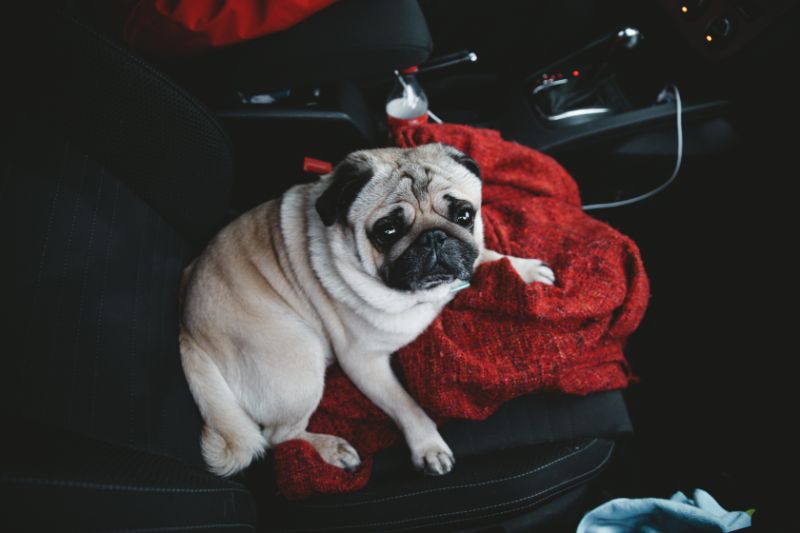
Pukey the Puppy: Do Dogs Get Car Sick

You’re riding in the car with your best pal and all of a sudden you hear them retch. Oh no! There’s another mess to clean up, and your pet clearly doesn’t feel their best.
Car sickness in pets is a common issue that pet owners relate to us. There are a few reasons for this and the team at Arlington Animal Hospital is here to help you deal with a dog with car sickness.
Why Do Dogs Get Motion Sickness?
A dog with car sickness is much like a child with car sickness; they are either anxious about the trip to the point of getting sick or they suffer from motion sickness.
Motion sickness occurs when there is repeated motion, such as from the car, that disturbs the balance of the inner ear. Puppies are more prone to car sickness, but they eventually grow out of it.
Symptoms of motion sickness include:
- Drooling
- Panting
- Restlessness
- Lip-licking
- Swallowing
- Hunched back
- Wide eyes
- Vomiting
We recommend that you call us for a thorough examination before beginning to desensitize your pet to car rides. There may be a medical reason for the illness, so we want to rule anything out.
If your pet is anxious about the car, you can introduce the car ride slowly. Take your pet out to the car and give them some treats and snuggles, or maybe their meal. Circle the block and hold your pet while someone else drives, petting them and reassuring them. Practice this, then increase the length of the car ride incrementally to desensitize your pet.
Reducing the Likelihood of Accidents
There may be no foolproof method of keeping your dog from getting sick in the car, but acclimiting them to varying lengths of travel can help. In most cases, car sickness is a result of stress rather than inner ear disturbance, so prevention mostly relies on making the experience in the car fun and normal for your dog.
Here are a few suggestions for your motion sickness furry.
- Don’t feed your pet 6-12 hours before your journey. If you must feed them, give them a few small treats or a minimal amount of kibble.
- Create a joyful experience in the car by providing toys and attention while they are getting used to car ride. Use treats as the absolute fall-back since this can contribute to vomiting.
- Make frequent stops along the way so your pet can get out and stretch, be petted, and get some exercise.
- Distract your dog by having other family members or friends along who can play with your dog.
- Consider raising your pet to eye level in the carrier or while they sit in a safety harness, attached to the seatbelt. This will help with the equilibrium of the inner ear and many dogs prefer to look out, as it makes them less restless.
- Bring plenty of towels and clean-up sprays, as well as a trash bag. Line the seat or crate with something you can launder.
- Ask your veterinarian about medications your pet can be prescribed to prevent nausea, such as maropitant, bonine, and dramamine.
When Your Dog Gets Car Sick
We hope this advice can help alleviate the stomach upset in your special pooch. Motion sickness can be a problem for some pets, but there are several things you can do to create a more pleasant ride for all.
To learn more about car sickness in pets, or to schedule an appointment, please do not hesitate to call us.
Contact Us!
2301 Columbia Pike #G-1, Arlington, VA 22204
Phone: (703) 920-5300
Fax: (703) 685-8860
Email: info@myarlingtonvet.com
Office Hours
-
Monday
8 a.m. – 8 p.m.
-
Tuesday
8 a.m. – 8 p.m.
-
Wednesday
8 a.m. – 6 p.m.
-
Thursday
8 a.m. – 6 p.m.
-
Friday
8 a.m. – 6 p.m.
-
Saturday
8 a.m. – 2 p.m.
-
Sunday
CLOSED
- Doctors’ hours are by appointment only.



